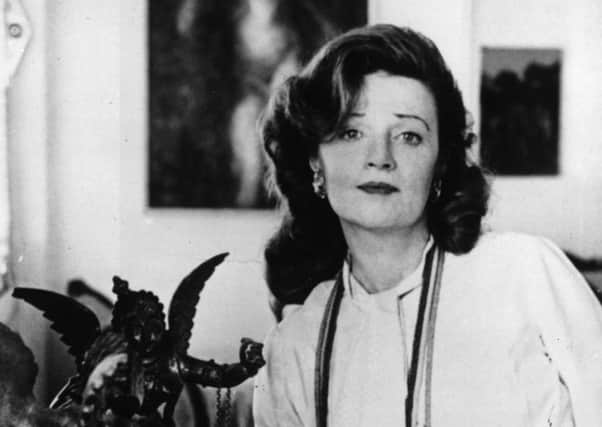Chapter One of The Hothouse by the East River by Muriel Spark, with an introduction by Ian Rankin


The Hothouse by the East River - Chapter One
If it were only true that all’s well that ends well, if only it were true.
She stamps her right foot.
She says, ‘I’ll try the other one,’ sitting down to let the salesman lift her left foot and nicely interlock it with the other shoe.
Advertisement
Hide AdHe says, ‘They fit like a glove.’ The voice is foreignly correct and dutiful.
She stands, now, and walks a little space to the mirror, watching first the shoes as she walks and then, half-turning, her leg’s reflection. It is a hot, hot day of July in hot New York. She looks next at the heel.
She looks over at the other shoes on the floor beside the chair, three of them beside their three open boxes and two worn shoes lying on their sides. Finally, she glances at the salesman.
He focuses his eyes on the shoes.
Now, once more, it is evening and her husband has come in.
She sits by the window, speaking to him against the purr of the air-conditioner, but looking away – out across the East River as if he were standing in the air beyond the window pane. He stands in the middle of the room behind her and listens.
She says, ‘I went shopping. I went to a shoe store for some shoes. You won’t believe me, what happened.’
He says, ‘Well, what was it?’
She says, ‘You won’t believe me, that’s the trouble. You aren’t sure that you’ll believe me.’
‘How do I know if you don’t tell me what it is?’
Advertisement
Hide Ad‘You’ll believe me, yes, but you won’t believe that it really happened. What’s the use of telling you? You don’t feel sure of my facts.’
‘Oh, tell me anyway,’ he says, as if he is not really interested.
Advertisement
Hide Ad‘Paul,’ she says, ‘I recognised a salesman in a shoe store today. He used to be a prisoner of war in England.’
‘Which P.O.W.?’
‘Kiel.’
‘Which Kiel?’
‘Helmut Kiel. Which one do you think?’
‘There was Claus, also Kiel.’
‘Oh, that little mess, that lop-sided one who read the books on ballet?’
‘Yes, Claus Kiel.’
‘Well, I’m not talking about him. I’m talking about Helmut Kiel. You know who I mean by “Kiel”. Why have you brought up Claus Kiel?’
Paul thinks: She doesn’t turn her head, she watches the East River.
One day he thought he had caught her, in profile, as he moved closer to her, smiling at Welfare Island as if it were someone she recognised. The little island was only a mass of leafage, seen from the window. She could not possibly have seen a person so far away down there.
Is it possible that she is smiling again, he thinks; could she be smiling to herself, retaining humorous reflections to herself ? Is she sly and sophisticated, not mad after all? But it isn’t possible, he thinks; she is like a child, the way she comes out with everything at this hour of the evening.
Advertisement
Hide AdShe tells him everything that comes into her head at this hour of the evening and it is for him to discover whether what she says is true or whether she has imagined it. But has she decided on this course, or can’t she help it? How false, how true?
It is true that in the past winter he has seemed to catch her concealing a smile at the red Pepsi-Cola sign on the far bank of the river. Now he thinks of the phrase, ‘tongue in cheek’, and is confused between what it means and how it would work if Elsa, with her head averted towards the river, actually put her tongue in her cheek, which she does not.
Advertisement
Hide AdAnd Paul, still standing in the middle of the carpet, then looks at her shadow. He sees her shadow cast on the curtain, not on the floor where it should be according to the position of the setting sun from the window bay behind her, cross- town to the West Side. He sees her shadow, as he has seen it many times before, cast once more unnaturally. Although he has expected it, he turns away his head at the sight.
‘Paul,’ she says, still gazing at the river, ‘go and get us a drink.’
Their son, Pierre, came to see them last night. He said, while they were discussing, by habit, in the hall, the problem of Mother: ‘She is not such a fool.’
‘Then I am the fool, to spend my money on Garven.’
‘She’s got to have Garven.’ He uttered this like a threat, intensifying his voice to scare away the opposition that he knew to be prowling.
Garven Bey is her analyst. Pierre is anxious that his mother should not go back into the clinic and so upset his peace of mind. Moreover, Pierre knows it was not his father’s money that went so vastly on Garven, but the surface-dust, the top silt, merely, of his mother’s fortune.
Last night, Paul said, as his son was leaving, ‘What did you think she looked like tonight?’
‘All right. There’s definitely something strange, of course …’
The Hothouse by the East River by Muriel Spark, with an introduction by Ian Rankin, Polygon, 144pp, £9.99